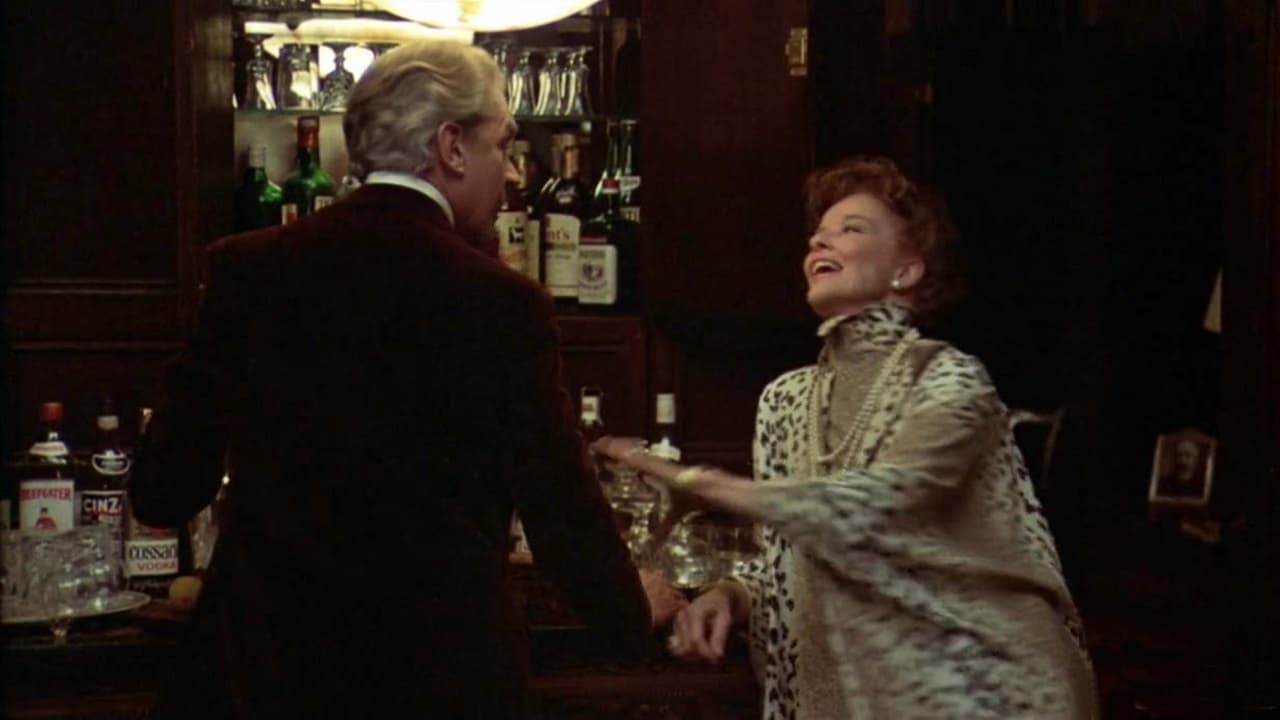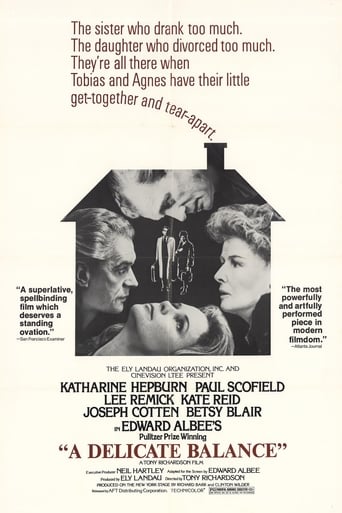Blucher
One of the worst movies I've ever seen
SpecialsTarget
Disturbing yet enthralling
Nessieldwi
Very interesting film. Was caught on the premise when seeing the trailer but unsure as to what the outcome would be for the showing. As it turns out, it was a very good film.
Neive Bellamy
Excellent and certainly provocative... If nothing else, the film is a real conversation starter.
HotToastyRag
In Edward Albee's play, Katharine Hepburn and Paul Scofield star as a married couple whose house is descended upon by Kate's sister, Kate Reid, their neighbors, Joseph Cotton and Betsy Blair, and their daughter, Lee Remick. They must find "a delicate balance" between everyone's problems and temperaments, as they hash out deep seeded resentments. In reality, the audience will need to find "a delicate balance" in order to keep their sanity while the movie is running.In a nutshell, Kate Hepburn is condescending and biting, Kate Reid is border-line insane and voices her fantasies about everyone in the house being killed, Joe and Betsy are scared and emotional for no apparent reason, Lee is a problem-child and hates her mother, and Paul just endures everyone with very little dialogue. It's a typical example of a boring, wordy, depressive play from a famous playwright that no one will actually enjoy seeing but theatre-goers will feel compelled to sit through lest they miss out on what their friends are talking about.I couldn't get through this horrendously boring play in any longer than ten-minute increments. If you're in the mood to torture yourself, you can give it a try, but I wouldn't recommend it.
bandw
After seeing this I tried to figure out why it is considered at all above the ordinary. The characters are: a domineering wife, a docile husband, an alcoholic sister, a daughter working on her fourth divorce, friends in a crisis of anxiety. I suppose this exaggerated mix is interesting to a playwright, but maybe not to an audience, at least to this member of the audience. My interest flagged while spending over two hours watching these unhappy people work through their long-standing problems.Katharine Hepburn as Agnes, the wife, is, well, Katharine Hepburn. That is good as far as it goes, but her performance here seemed overly rehearsed--every body movement and spoken line struck me as anything but spontaneous. If I had not known that it was Paul Schofield as Tobias, the husband, I would not have found his performance all that remarkable. Kate Reid's performance as Claire, Agnes' alcoholic sister, might play well on stage, but here it struck me as embarrassingly overacted, perhaps exaggerated by the extreme close-ups and silly script elements like the accordion playing. Lee Remick did add some spark as Julia, the much-divorced daughter. Betsy Blair, as Edna, a supposed friend, gave little indication why Agnes and Tobias should find her of value (not sure if this was a result of her performance or the script). Joseph Cotton, as Harry, Edna's husband, turned in the most sincere performance, making me think that he has been under-appreciated as an actor.I liked the question raised of when love for friends equals, or even trumps, inherent family bonds. This play gives credence to Robert Frost's quote, "Home is the place, when you have to go there, they have to take you in," and submits that this quote is not as nearly a given when applied to friends.I found some character behaviors unfathomable. Consider Julia's reaction to Harry and Edna's taking over her bedroom. She was insulted by this from the beginning, but about midway through the play she went ballistic and finally flew upstairs in a rage. Later Harry reported that Julia had become hysterical and was blocking a doorway with her arms outstretched. I fully expected that in subsequent scenes Julia would be carted off to the nut house, but no, the next morning she was calm and collected. When Harry and Edna came in to the house uninvited, with the intention of moving in, they appeared to be disconnected from reality. But then overnight they became rational.Spending time with these people would be something that I would not look forward too, but neither did I want to spend two hours with them in this movie, being confined to a house with nothing to entertain but conversation. On the other hand, I would not want to spend time with George and Martha of, "Who's Afraid of Virginia Woolf" either, but I found that movie spellbinding. Rather than the filming of a stage play, this movie is an adaptation. No matter how director Richardson tries to break up the monotony by mixing close-ups and two shots and using different vantage points for the camera, he cannot overcome the essential staginess, particularly given Albee's stricture that his text was not to be changed. I think that the filming of a stage production of this might have been preferable, since there is no pretense there of a realistic setting. It was a delicate balance for the family in this play to stay together but the movie fails to achieve the delicate balance of turning a stage play into an engrossing movie.I think only those who appreciate stage productions will truly appreciate this movie.
wlawson60
There is no music in this superb autumn melody. The words in the mouths of the characters are by Edward Albee and that is music enough. Katharine Hepburn plays Agatha, a close relative of the actress if I ever saw one, Paul Scofield is amazing playing the mild volcano of a husband promising eruptions that when they come they are so civilized that, irrigate rather than decimate. Kate Reid, took over from the extraordinary Kim Stanley and as sensational as Miss Reid is I can't help wondering what Stanley would have done with "a" alcoholic like Claire. Lee Remick is the perfect offspring for Hepburn and Scofield. Selfish, tenuous, childish, rich failure. Joseph Cotten and Betsy Blair are the catalysts, they and their fear, their plague coming to contaminate the contaminated. For film and stage gourmets this is an unmissable treat.
jmorris236
I saw this film in 1973 and loved it so much that I ran out and purchased the soundtrack – yes, there was a soundtrack released. It came in a three-record boxed set, and it included every single word of the screenplay. I then bought a copy of the play (which was slightly different from the screenplay) and read it and listened to the record until I had memorized a good deal of the dialogue. You see, I love the English language, and there are few things more joyful to me than encountering a book, play or movie that uses language in clever ways. This is why I am a great fan of Broadway lyricist Stephen Sondheim, Screenwriter James Goldman (who wrote Lion in Winter) and Simon Gray (who wrote Butley, and whose use of the language rivals Albee's here). And, of course, the plays of Edward Albee. Mr. Albee uses language in ways that few others can. For some reason I don't understand, few people can seem to mention A Delicate Balance without referring to a certain play that Mr. Albee's also wrote, which was far more sensational and extremely successful.And that's a real pity, for this work stands quite well on its own.Tobias and Agnes are an upper-class couple nearing retirement in their comfortable Connecticut home. Their best friends, Harry and Edna, arrive for a visit one evening, driven from their home by an unnamed terror. Albee's play clearly spells out what the terror is, without attaching a precise name to it – it's the fear of growing older in an uncertain world, rather like the main theme (which many people missed) in James Goldman and Stephen Sondheim's brilliant musical, Follies. Of course, Tobias and Agnes must take their dear friends in, thus threatening the "delicate balance" that holds their routines together. What follows is a careful dissection of the obligations of friendship, the meaning of loyalty, the responsibility of family and the appearance and practical application of "proper" etiquette. All in all, Mr. Albee takes on quite a bit.Added to the fray is Claire, Agnes' alcoholic sister (who doesn't seem to drink any more or less than the other characters in the piece, who are always mixing each other cocktails) and their daughter, Julia, who is coming home from her fourth failed marriage. Harry and Edna have taken over Julia's room, and she doesn't like it at all.Yes, the story moves very slowly, but I was glad that it did – it takes time and patience to absorb Albee's delicious wit, and even the very intelligent will find the language difficult to follow in parts. The film generally requires more than one viewing to ingest, but lovers of good drama will find their patience rewarded. I had the good fortune to also see the 1996 Broadway production with Rosemary Harris and Elaine Stritch as Agnes and Claire, respectively. That production did benefit from a slightly increased pace, but, on the whole, I find I still like to savor the drawn out lazy unwinding of this most articulate film.

